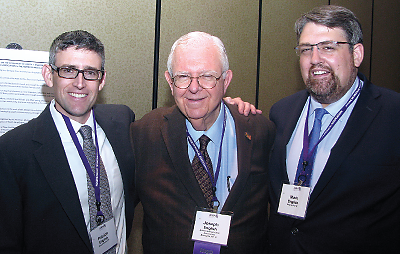English Retires From AMA Post After Decades of Leadership
Abstract
Former APA President Joseph T. English, M.D., a long-time member and past chair of the AMA Section Council on Psychiatry, is retiring from the section council after 19 years of service. At last month’s Interim Meeting of the AMA House of Delegates, English was honored at a reception attended by fellow section council members and other AMA leaders.

Pictured here with sons Patrick (left) and Mark (right), English has been a major figure in the success of the Section Council on Psychiatry. At the reception, current Section Council Chair Carolyn Robinowitz, M.D., presented English with a plaque citing his “extraordinary leadership and outstanding contributions to the field of psychiatry and strong advocacy for quality patient care. ...”
In a letter to English written on behalf of the psychiatric delegation at the AMA, Robinowitz, who has been a participant in the AMA House of Delegates since 1977, recalled that psychiatry had long experienced dismissiveness by the rest of the House of Medicine.
English helped to change that. “When you joined the delegation in the mid-1990s, you realized something had to be done to improve our functioning and effectiveness,” Robinowitz wrote. “You initiated a strategic-planning process involving representatives from APA and the American Academy of Child and Adolescent Psychiatry, as well as the few psychiatrists who were representatives of state medical societies. ... You led the way in clarifying our strengths…and assisted the group in developing a five-year and longer-term plan and a list of strategic priorities to improve our functioning in the AMA.
“Those efforts bore almost immediate fruit, and within the ensuing 15 years some two dozen psychiatrists from the section council, as well as state medical societies, earned elected and appointed leadership positions within the AMA,” Robinowitz wrote. “Even more to the point was the extraordinary change in attitude toward us and our profession, from dismissiveness to admiration and inclusiveness, and even envy, as other specialties asked how we had become so successful.”
In remarks to Psychiatric News, English recalled that as the lone delegate representing APA in the 1990s, he and then-alternate delegate Ronald Shellow, M.D., endorsed a resolution that made the number of delegates for a specialty society dependent on how many of the society’s members were also AMA members. “We went to our [APA] membership to explain how important this was, and their response was remarkable,” English said. “Soon we had 10,000 of them as dues-paying members of the AMA, and we were rewarded with seven delegates and seven alternates, with a great opportunity to achieve psychiatry’s goals.
“Working very hard, we were able over the years to have at least one psychiatrist on every appointed and elected component of the AMA and were tremendously proud when one of our members, Jeremy Lazarus, M.D., became speaker of the House of Delegates and was then elected AMA president unanimously.”
He added, “We continue to make extraordinary progress, and we shall forever be grateful for the support APA gave to make this possible.” ■



